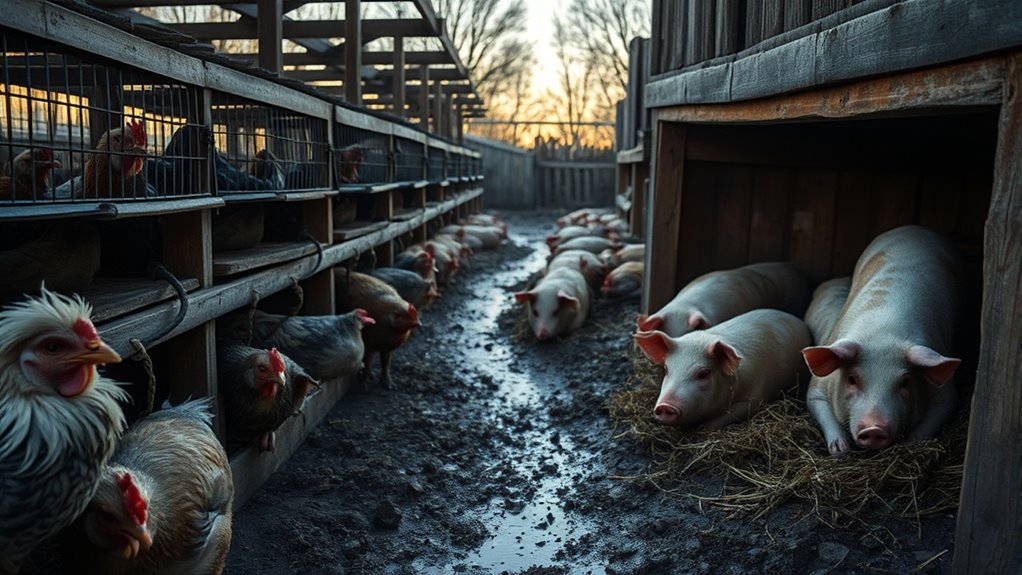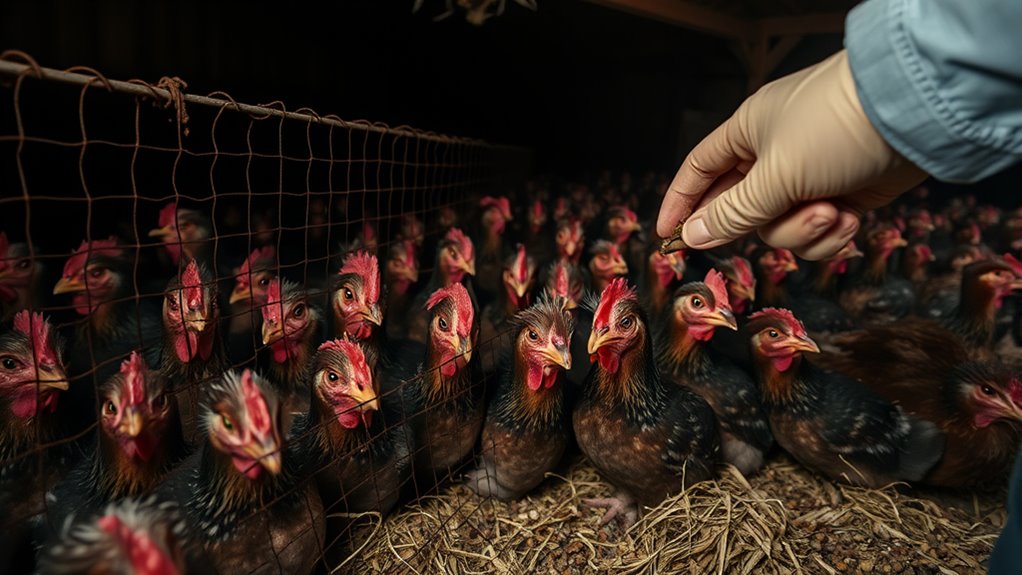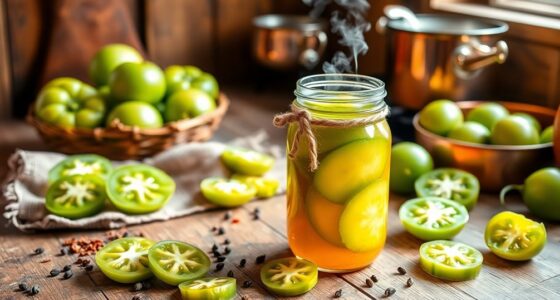When you consider the ethics of eating, your choices directly affect animal welfare and how food is produced. Intensive farming often keeps animals in cramped, unsanitary conditions, causing suffering, while alternatives like free-range and organic systems provide better lives. Slaughter methods also raise concerns about pain and humane treatment. Supporting more compassionate practices can make a difference, and if you explore further, you’ll discover ways to align your eating habits with your values.
Key Takeaways
- Ethical concerns focus on animal suffering caused by intensive farming practices and the importance of humane treatment.
- Alternatives like free-range and organic farming promote better animal welfare and align with moral values.
- Poor slaughter methods can cause pain; implementing humane procedures reduces animal distress.
- Consumer choices significantly influence industry standards and can drive reform toward more ethical food production.
- Eating reflects personal morals; supporting humane practices helps create a more ethical and compassionate food system.

Eating is a fundamental part of life, but it also raises complex ethical questions. When you sit down to enjoy your meal, you mightn’t think about the journey that food has taken to reach your plate or the moral implications behind its production. One of the most debated issues in food ethics revolves around animal welfare. As consumers, your choices can have a significant impact on the lives of countless animals raised for food. The question is: are the methods used in modern food production humane, or do they cause unnecessary suffering?
Intensive farming practices, which dominate the industry, often prioritize efficiency over animal well-being. You might be unaware that many animals are kept in cramped, unsanitary conditions, with little room to move or express natural behaviors. Chickens are often confined in battery cages, unable to stretch their wings, while pigs may be crammed into tiny stalls for their entire lives. These conditions can lead to physical and psychological suffering, raising serious ethical concerns. Understanding animal suffering in farming practices is crucial to evaluating food ethics.
Many farm animals endure cramped, unsanitary conditions, causing suffering and raising urgent ethical concerns.
When you buy products from such sources, you’re inadvertently supporting systems that prioritize profit over animal comfort. On the other hand, there are farming practices that aim to improve animal welfare, such as free-range, pasture-raised, or organic methods. These systems allow animals more space, access to outdoors, and better living conditions. Choosing these options can reflect your values and promote more humane treatment.
However, such products often come with higher price tags, which can make them less accessible. This raises an ethical dilemma: do you prioritize your health and budget, or do you support systems that uphold animal dignity, even if it costs more? Your purchasing decisions can encourage farmers to adopt better practices and challenge the industry to reform.
Furthermore, ethical considerations extend beyond the animals’ living conditions to how they’re slaughtered. Many methods used in slaughterhouses are designed for efficiency but can cause pain and distress if not properly managed. Ensuring humane slaughter practices is essential, and as a consumer, you can advocate for transparency and stricter regulations.
Supporting organizations that promote humane treatment or choosing products certified for ethical slaughter can make a difference. Ultimately, your choices about what you eat reflect your values and beliefs about the treatment of animals. By becoming more conscious of how food is produced and advocating for higher welfare standards, you can help create a food system that respects animal life and reduces suffering.
It’s not just about what’s on your plate, but about the moral footprint you leave behind with every meal.
Frequently Asked Questions
How Do Different Cultures Perceive Animal Welfare in Food Production?
You see that different cultures view animal welfare in food production in unique ways. Some prioritize humane treatment and strict regulations, while others focus on efficiency and tradition.
You might notice that Western societies often emphasize animal rights, whereas others accept certain practices based on cultural or religious beliefs.
What Are the Economic Impacts of Ethical Farming Practices?
You might think ethical farming costs more, yet it can boost profits by attracting conscious consumers. While traditional methods save money upfront, they risk future costs from health issues and reputation damage.
Ethical practices foster loyalty, reduce risks, and often lead to higher-quality products. So, balancing ethical standards with economic gains isn’t just ideal — it’s smart, ensuring sustainability and profitability in the long run.
How Can Consumers Verify Ethical Claims on Food Labels?
You can verify ethical claims on food labels by researching certifying organizations like USDA Organic, Fair Trade, or Animal Welfare Approved. Look for specific certifications and visit their websites to understand their standards.
Contact brands directly with questions about their sourcing practices. Additionally, supporting local farms and markets allows you to ask producers about their animal welfare policies, ensuring your choices align with your values.
Are Plant-Based Diets Truly More Sustainable Than Animal-Based Diets?
You might think plant-based diets are just a little better for the planet, but they’re actually worlds apart from animal-based diets when it comes to sustainability.
What Is the Role of Government Regulation in Ensuring Animal Welfare?
You might wonder how government regulation helps guarantee animal welfare. It’s your role to recognize that strict laws set minimum standards for humane treatment, prevent cruelty, and improve living conditions.
By supporting enforcement and advocating for stronger policies, you contribute to better oversight. Regulations hold producers accountable and protect animals from suffering.
Your awareness and participation can influence policies that promote compassionate, ethical treatment across the food production industry.
Conclusion
As you consider where your food comes from, remember you’re steering a ship through ethical waters. Every choice on your plate influences the world around you, shaping the future of animal welfare. By choosing more compassionate options, you become a captain charting a course toward kinder, more sustainable seas. Your actions ripple outward, like gentle waves, reminding us all that eating ethically isn’t just a personal decision—it’s a movement that can transform the entire ocean of food production.









